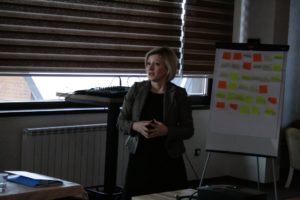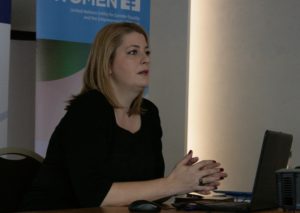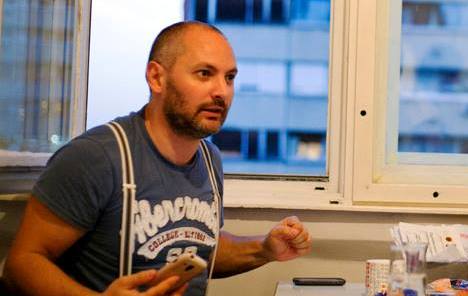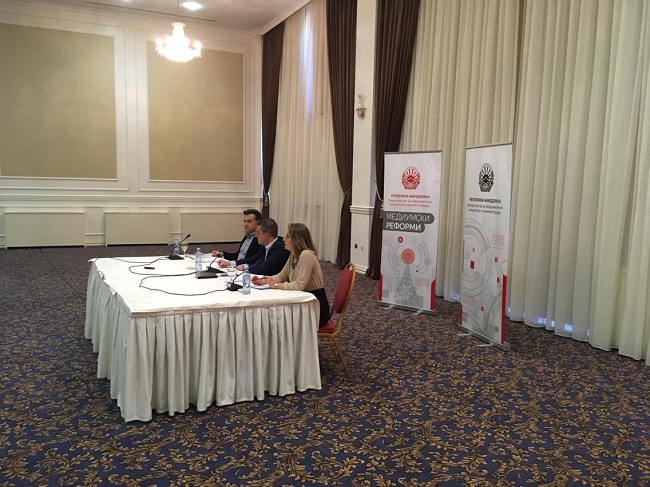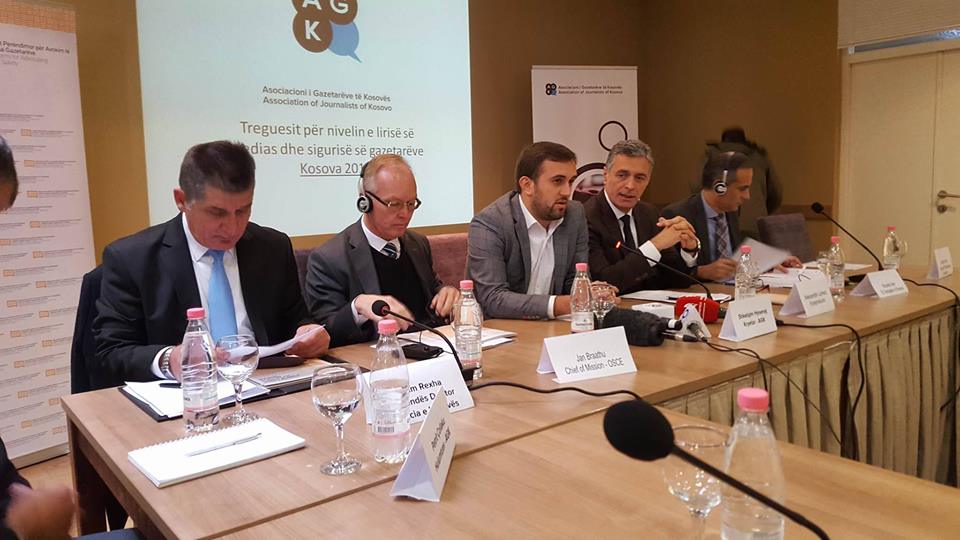BEOGRAD, 21.11.2017. – Predstavnici medijskih udruženja sastaće se danas kako bi se dogovorili oko izlaska ili zamrzavanja rada svojih članova u stalnoj radnoj grupi za bezbednost novinara, kao reakciju na odluku Prvog osnovnog tužilaštva da odbaci krivične prijave za napade na novinare tokom inauguracije predsednika Aleksandra Vučića.
Tužilaštvo je odbacilo krivičnu prijavu protiv obezbeđenja SNS za napad na novinarku Danasa Lidiju Valtner, kao i novinare Insajdera, Vajsa, učesnika Protesta protiv diktature Marka Radosavljevića i “povremenog” foto-reportera Tanjuga.
O sledećem koraku odlučivaće NUNS, NDNV, ANEM, AOM, LP i ASMEDI, a pozvan je i UNS, saznaje Danas nezvanično, a uz to će formulisati zahteve za nastavak neometanog rada stalne radne grupe za bezbednost novinara. U toj radnoj grupi učestvuju i predstavnici nadležnih državnih organa – Ministarstva unutrašnjih poslova i Republičkog javnog tužilaštva.
Ono što novinarima sada preostaje, savetuje profesorka prava Vesna Rakić Vodinelić, jeste da ulože prigovor Višem javnom tužilaštvu zbog odbacivanja krivične prijave protiv napadača.
– Treba izjaviti prigovor nadležnom Višem tužilaštvu, a ako i ono odbije slučaj kao što bi se moglo očekivati, onda postoji mogućnost žalbe Ustavnom sudu, a posle i Evropskom sudu za ljudska prava – predlaže Rakić Vodinelić, dodajući da je svesna nepoverenja koje postoji prema našem pravnom sistemu. Dok se ovaj proces ne završi neće biti moguće vođenje prekršajnih postupaka, kako je Više javno tužilaštvo naložilo MUP da podnese prekršajne prijave, objašnjava Rakić Vodinelić.
– Ne mogu se istovremeno zbog iste radnje voditi prekršajni i krivični postupak, možete povesti jedan od njih, nije nikakva greška povesti krivični umesto prekršajnog. Ovde se može razgovarati o prekršaju jer redari koji obezbeđuju skup a ne pripadaju policiji su kao i svi drugi građani dužni da poštuju javni red i mir i ne smeju se fizički obračunavati, naglašava ona.
Profesorka prava ističe da je problematično obrazloženje Tužilaštva o ponašanju redara jer su se više oslonili na njihove iskaze nego na fotografije koje pokazuju njihovo ponašanje.
– Tužilaštvo je poverovalo da su redari zapravo spasili, između ostalog i novinare od linča. Iz toga proizilazi zaključak da Tužilaštvo u stvari smatra da taj skup nije bio namenjen samo slavljenju izbora predsednika, nego i linču neistomišljenika, to je jedini logičan zaključak koji kao pravnik mogu izvući. Ako je tako, onda postoji odgovornost sazivača skupa Srpske napredne stranke, i ne samo to, nego vidimo da javno tužilaštvo tako misli, ukazuje Rakić Vodinelić.
Policija okretala glavu
Vesna Rakić Vodinelić naglašava i da se na fotografijama vidi da je prisutna policija u uniformi, koja stoji u blizini i okreće glavu na drugu stranu dok su novinari i građani napadani, a da je tužilaštvo to moralo da uzme u obzir. Ona je podsetila i na reakciju nadležnih organa kada je napadnuta novinarka Pinka tokom skupa pokreta Dveri, zaključujući da “dolazimo do nečega što je mnogo opasnije od vizure političkih stranaka, a to je diskriminacija od strane državnih organa kao što su u ovom slučaju policija, tužilaštvo…”.


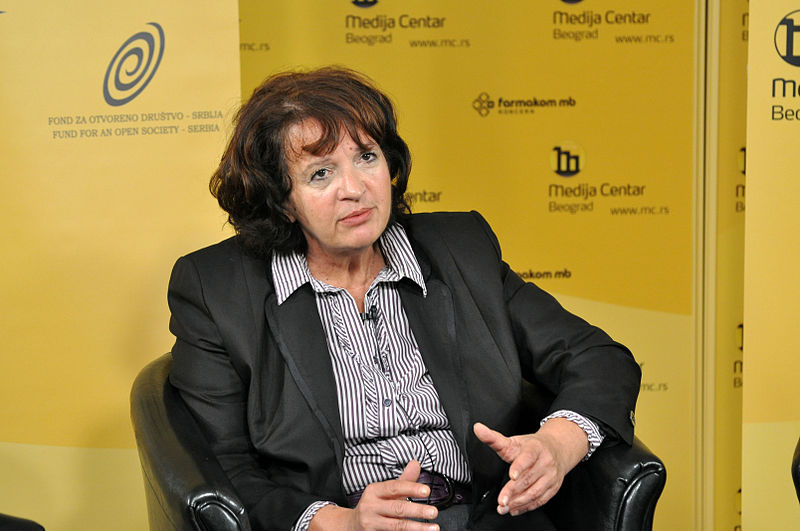
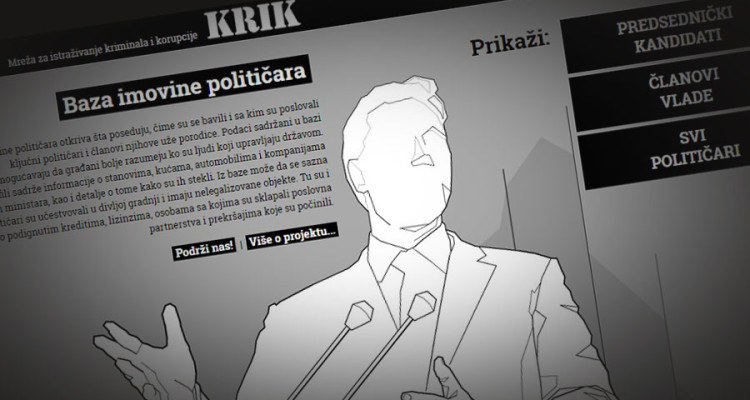
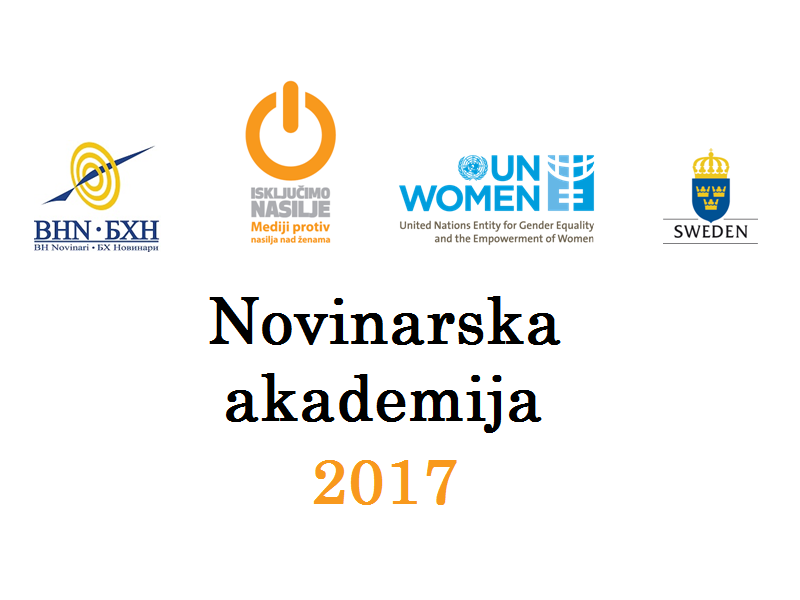
 Vedrana Lemez, fourth year of journalism at the Faculty of Philosophy, Pale: “I expect to find out more about gender-based violence at the Journalists Academy. Since I think that a good choice of lecturers for all three days of the Academy was made and that these are people with long years of professional experience, which will be useful to all of us. The problem is that gender-based violence in BiH is not adequately addressed, the media are not always professional at reporting this issue and there is not enough critical review or research journalism, encluding plans that will be long-term for victims of violence. ”
Vedrana Lemez, fourth year of journalism at the Faculty of Philosophy, Pale: “I expect to find out more about gender-based violence at the Journalists Academy. Since I think that a good choice of lecturers for all three days of the Academy was made and that these are people with long years of professional experience, which will be useful to all of us. The problem is that gender-based violence in BiH is not adequately addressed, the media are not always professional at reporting this issue and there is not enough critical review or research journalism, encluding plans that will be long-term for victims of violence. ” Mersiha Čomor, student of the first year of International Relations and Diplomacy, Mostar: “From the Journalists Academy, I expect the expansion of knowledge on gender-based violence, because I have not met this topic before. A person does not deserve to be a victim, any kind of violence. ”
Mersiha Čomor, student of the first year of International Relations and Diplomacy, Mostar: “From the Journalists Academy, I expect the expansion of knowledge on gender-based violence, because I have not met this topic before. A person does not deserve to be a victim, any kind of violence. ” Simona Joksimović, second year of the Faculty of Political Science, Banja Luka: “I believe that gender-based violence is a very important and important topic that should be much more discussed because it is the worst thing that can happen to a woman or girl. I learned how I should reporton gender-based violence in the future and how empathy and empathy are really important in casual conversations. Our task as future journalists is to draw more attention to the importance of this problem and to help victims of violence to get the right help. A good weapon for the prevention of gender-based violence and an indicator of the possibilities of solving the problem of violence. “
Simona Joksimović, second year of the Faculty of Political Science, Banja Luka: “I believe that gender-based violence is a very important and important topic that should be much more discussed because it is the worst thing that can happen to a woman or girl. I learned how I should reporton gender-based violence in the future and how empathy and empathy are really important in casual conversations. Our task as future journalists is to draw more attention to the importance of this problem and to help victims of violence to get the right help. A good weapon for the prevention of gender-based violence and an indicator of the possibilities of solving the problem of violence. “ Bobana Ćevriz, a student of the fourth year of journalism at the Faculty of Philosophy, Pale: “It is a great honor and pleasure to be a part of this training, and at the Journalists Academy I had the opportunity to learn new things and to improve my knowledge in the field of gender-based violence. Through discussion with brilliant lecturers, we came to the conclusion that violence against women is increasing in our society, and that the media often send the wrong message to the public, and media space is given to perpetrators rather than victims. Media should report on violence against women, to submit more information about Safe Houses and solutions to women who are victims of violence, to provide support for them to seek help and talk about their problems. “
Bobana Ćevriz, a student of the fourth year of journalism at the Faculty of Philosophy, Pale: “It is a great honor and pleasure to be a part of this training, and at the Journalists Academy I had the opportunity to learn new things and to improve my knowledge in the field of gender-based violence. Through discussion with brilliant lecturers, we came to the conclusion that violence against women is increasing in our society, and that the media often send the wrong message to the public, and media space is given to perpetrators rather than victims. Media should report on violence against women, to submit more information about Safe Houses and solutions to women who are victims of violence, to provide support for them to seek help and talk about their problems. “ Kanita Beširović, a student of the fourth year of the Faculty of Philosophy in Tuzla, the journalism department: “Journalists academy is a new and interesting experience for me. First of all, I learned a lot of useful information from our lecturers starting from ethical reporting on violence against women until understanding what do women victims of violence go through.”
Kanita Beširović, a student of the fourth year of the Faculty of Philosophy in Tuzla, the journalism department: “Journalists academy is a new and interesting experience for me. First of all, I learned a lot of useful information from our lecturers starting from ethical reporting on violence against women until understanding what do women victims of violence go through.” Almedina Atlagić, a student of the fourth year of the Faculty of Philosophy in Tuzla, department of Journalism: “This is my first participation at the Journalists Academy and I am very pleased to be here with all these young people. I have not been so well-versed in this topic. For these three days, the Academy has surpassed all my expectations, both in lectures and in lecturers who have worked most professionally to teach us something. in order to better understand and solve the problem as easily as possible. ”
Almedina Atlagić, a student of the fourth year of the Faculty of Philosophy in Tuzla, department of Journalism: “This is my first participation at the Journalists Academy and I am very pleased to be here with all these young people. I have not been so well-versed in this topic. For these three days, the Academy has surpassed all my expectations, both in lectures and in lecturers who have worked most professionally to teach us something. in order to better understand and solve the problem as easily as possible. ” Ivan Stojnić, a student of the third year of journalism and communication at the Faculty of Political Science, Banja Luka: “Today we witness various forms of violence, especially over women and girls, and I believe that it is necessary for the whole society to engage in finding the right solution and to exclude violence. The Academy is a new experience in which I expanded my knowledge of gender-based violence, but also met new people who expressed their opinions about the state of the media and how it is being reported today about women who have suffered violence. I like the critical approach to this topic as well as the way it is presented. We as future media workers need to be educated on how to report professionally and ethically tomorrow about violence against women. ”
Ivan Stojnić, a student of the third year of journalism and communication at the Faculty of Political Science, Banja Luka: “Today we witness various forms of violence, especially over women and girls, and I believe that it is necessary for the whole society to engage in finding the right solution and to exclude violence. The Academy is a new experience in which I expanded my knowledge of gender-based violence, but also met new people who expressed their opinions about the state of the media and how it is being reported today about women who have suffered violence. I like the critical approach to this topic as well as the way it is presented. We as future media workers need to be educated on how to report professionally and ethically tomorrow about violence against women. ” Sanjin Gajip, First year student of the Faculty of Media and Communication, Travnik: “At the Journalists Academy, I gained new experiences, met different people and heard new thinking. As for the topic, I deepened my knowledge of violence during this academy and through my profession I will try to keep the public informed about this and prevent the further spread of violence. I recommend participating at the Academy to all young journalists, as this is another experience in life. ”
Sanjin Gajip, First year student of the Faculty of Media and Communication, Travnik: “At the Journalists Academy, I gained new experiences, met different people and heard new thinking. As for the topic, I deepened my knowledge of violence during this academy and through my profession I will try to keep the public informed about this and prevent the further spread of violence. I recommend participating at the Academy to all young journalists, as this is another experience in life. ” Kristina Gadže, a student of the third year of journalism at the Faculty of Philosophy of the University of Mostar: “The Journalists academy gave me an excellent insight into the topic of gender-based violence that is now ubiquitous. Media insufficiently represent this problem as a social problem and try to present a man as a victim of different circumstances. I believe that institutions responsible for solving this form of violence should be more actively involved and support the victims of violence. “
Kristina Gadže, a student of the third year of journalism at the Faculty of Philosophy of the University of Mostar: “The Journalists academy gave me an excellent insight into the topic of gender-based violence that is now ubiquitous. Media insufficiently represent this problem as a social problem and try to present a man as a victim of different circumstances. I believe that institutions responsible for solving this form of violence should be more actively involved and support the victims of violence. “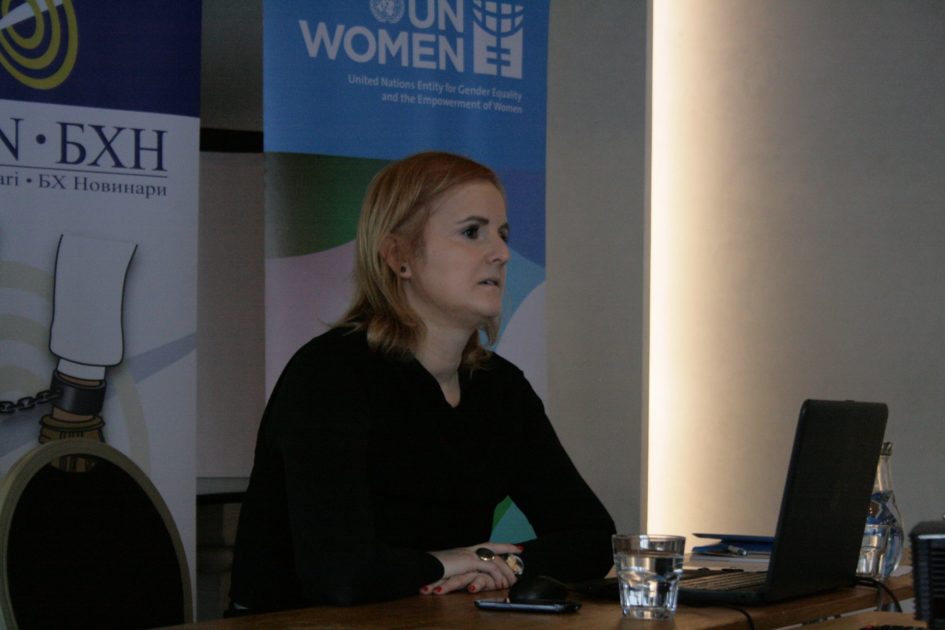
 Violence against women always implies a certain form of discrimination and violation of human rights, and the struggle against gender-based violence demands a dramatic turnaround in human consciousness and public perception of this social problem, was highlighted, at the Journalist Academy 2017 for journalism students “Reporting on Gender Issues based violence “that is being held in Jahorina.
Violence against women always implies a certain form of discrimination and violation of human rights, and the struggle against gender-based violence demands a dramatic turnaround in human consciousness and public perception of this social problem, was highlighted, at the Journalist Academy 2017 for journalism students “Reporting on Gender Issues based violence “that is being held in Jahorina.